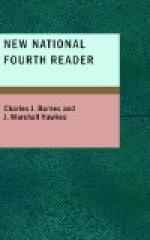“As wood was rather scarce, they used for fuel a certain kind of stone which they dug out of the earth, and which, when put among burning wood, catches fire and makes a bright flame.”
“Dear me!” said Harry. “What a wonderful stone! Why didn’t you bring a piece home with you, father?”
“I have a piece, which I will show you some time,” replied the captain. “But to go on with my story.
“What these people eat is remarkable, too. Some of the poor people eat fish which had been hung up and smoked until quite dry and hard, and along with it they eat the roots of plants, or coarse, black cake made of powdered seeds.
“The rich people have a whiter kind of cake upon which they spread a greasy matter that is obtained from a large animal. They eat also the flesh of many birds and beasts when they can get it, and the leaves and other parts of a variety of vegetables—some raw and others cooked.
“For drink they use the water in which certain dry leaves have been steeped. These leaves, I was told, came from a country a great distance away.
“I was glad to leave this country because it was so very cold; but about six months after, I was obliged to go there again. What was my surprise to find that great changes had taken place!
“The climate was mild and warm, and the country was full of beauty and verdure. The trees and shrubs bore a great variety of fruits, which, with other vegetable products, were used largely as food.
“The people were gentle and civilized. Their dress was varied. Many wore cloth woven from a sort of wool grown in pods on bushes.
“Another singular material was a fine, glossy stuff used chiefly by the rich people. I was told that it was made out of the webs of caterpillars, which to me seemed quite wonderful, as it must have taken a great number of caterpillars to produce the large quantity of the stuff that I saw.
“These people have queer ideas about their dress. The women wear strangely figured garments, and adorn their heads, like some Indian nations, with feathers and other fanciful head-dresses.
“One thing surprised me very much. They bring up in their houses an animal of the tiger species, having the same kind of teeth and claws as the tiger.
“In spite of the natural fierceness of this little beast, it is played with and caressed by the most timid and delicate of their women and children.”
“I am sure I would not play with it,” said Harry.
“You might get an ugly scratch, if you did,” said the captain.
“Aha!” cried Mary; “I’ve found you out: you have been telling us of our country and what is done at home all this while!”
“But we don’t burn stones, or eat grease and powdered seeds, or wear skins and caterpillars’ webs, or play with tigers,” said Harry.
“No?” said the captain. “Pray, what is coal but a kind of stone; and is not butter, grease; and wheat, seeds; and leather, skins; and silk, the web of a kind of caterpillar; and may we not as well call a cat an animal of the tiger kind, as a tiger an animal of the cat kind?”




